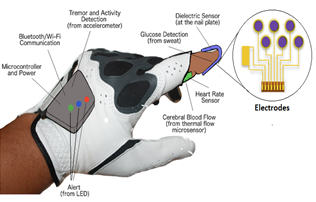A Noninvasive Monitor to Predict Hypoglycemia in Diabetes Patients Using Artificial Intelligence
 The identification of hypoglycemia is critical to reduce the morbidity and mortality among patients with type 1 or type 2 diabetes, especially in patients treated with insulin. This research proposal investigates the utility of non-invasive physiological sensor technologies and machine learning techniques to predict the development of hypoglycemia. The prediction of a hypoglycemic event through non-invasive monitoring would have a major impact on the ability of the patient and healthcare provider to achieve optimal glycemic control without increasing the risk of hypoglycemia. A non-invasive wearable sensor that predicts the development of hypoglycemia may prevent the significant morbidity and mortality associated with severe hypoglycemia.
The identification of hypoglycemia is critical to reduce the morbidity and mortality among patients with type 1 or type 2 diabetes, especially in patients treated with insulin. This research proposal investigates the utility of non-invasive physiological sensor technologies and machine learning techniques to predict the development of hypoglycemia. The prediction of a hypoglycemic event through non-invasive monitoring would have a major impact on the ability of the patient and healthcare provider to achieve optimal glycemic control without increasing the risk of hypoglycemia. A non-invasive wearable sensor that predicts the development of hypoglycemia may prevent the significant morbidity and mortality associated with severe hypoglycemia.
In this project, the team will develop a wearable device that applies sophisticated machine learning techniques on measures of skin temperature, tremor, whole body acceleration, heart rate, sweat rate and skin glucose to detect and predict hypoglycemia in patients with diabetes.
Members
Lead Principal Investigator (LPI):
-
Dr. Rayaz Malik, Weill Cornell Medicine, Qatar (Email:
ram2045@qatar-med.cornell.edu)
Principal Investigators (PI):
-
Dr. John-John Cabibihan, Mechanical and Industrial Engineering
Department, QU (Email:
john.cabibihan@qu.edu.qa)
-
Dr. Abdulaziz Al-Ali, KINDI Center for Computing Research, Qatar
University (Email:
a.alali@qu.edu.qa)
-
Dr. Kishor Kumar Sadasivuni, Center of Advanced Material, Qatar
University (Email: kushorkumars@qu.edu.qa)
Research Assistants (RA):
-
Ahmed Yaser Alhaddad, Mechanical and Industrial Engineering Dept,
Qatar University (Email:
a.yaser@qu.edu.qa)
-
Hoda Gad, Weill Cornell Medicine in Qatar (Email:
hyg2002@qatar-med.cornell.edu)
-
Hussein Ahmed Aly, KINDI Center for Computing Research, Qatar
University (Email:
hussien.aly@qu.edu.qa)
-
Sreedevi Paramparambath, Center of Advanced Material, Qatar University
(Email: sreedevi.p@qu.edu.qa)
Publications
-
Elsafi A.M., Krishnasamy V., Kannan K., Cabibihan J.J., AlAli A.K.,
Malik R.A., Sadasivuni K.K., "Non-invasive Electrochemical Detection
of Glucose using CuO-NiO/MXene Modified Electrode", Qatar University
Annual Research Forum and Exhibition (QUARFE 2020), Doha, 2020,
https://doi.org/10.29117/quarfe.2020.0096
-
Elsafi A.M., Krishnasamy V., Kannan K., Cabibihan J.J., AlAli A.K.,
Malik R.A., Sadasivuni K.K., "Construction of Modified CuO-Co3O4-ZnO
Electrode for Acetone Detection in Breath", Qatar University Annual
Research Forum and Exhibition (QUARFE 2020), Doha, 2020,
https://doi.org/10.29117/quarfe.2020.0098
-
Shafath S., Krishnasamy V., Kannan K., Cabibihan J.J., AlAli A.K.,
Malik R.A., Sadasivuni K.K., "Detection of acetone in breath solution
using nanocomposite CeO2-NiO-ZnO", Qatar University Annual Research
Forum and Exhibition (QUARFE 2020), Doha, 2020,
https://doi.org/10.29117/quarfe.2020.0100
-
Riyaz N.U.S., Kannan K., Krishnasamy V., Cabibihan J.J., AlAli A.K.,
Malik R.A., Sadasivuni K.K., "Biosensing studies on CuO-MgO
nanocomposites for glucose detection", Qatar University Annual
Research Forum and Exhibition (QUARFE 2020), Doha, 2020,
https://doi.org/10.29117/quarfe.2020.0095
-
Shafath S., Krishnasamy V., Kannan K., Cabibihan J.J., AlAli A.K.,
Malik R.A., Sadasivuni K.K., "Synthesis, characterization and
biosensor applications of CuO-NiO nanocomposite", Qatar University
Annual Research Forum and Exhibition (QUARFE 2020), Doha, 2020,
https://doi.org/10.29117/quarfe.2020.0101
-
Thatikayala, D.; Ponnamma, D.; Sadasivuni, K.K.; Cabibihan, J.-J.;
Al-Ali, A.K.; Malik, R.A.; Min, B. Progress of Advanced Nanomaterials
in the Non-Enzymatic Electrochemical Sensing of Glucose and H2O2.
Biosensors 2020, 10, 151. https://doi.org/10.3390/bios10110151
Dates
Started: June 1, 2019
Ends: May 31, 2022
Funding (if applicable)
Funded By: QNRF – NATIONAL PRIORITY RESEARCH PROGRAM.
Project Number: NPRP11S-0110-180247
Collaborating Institutions (if applicable)
Industrial Collaborators (if applicable)